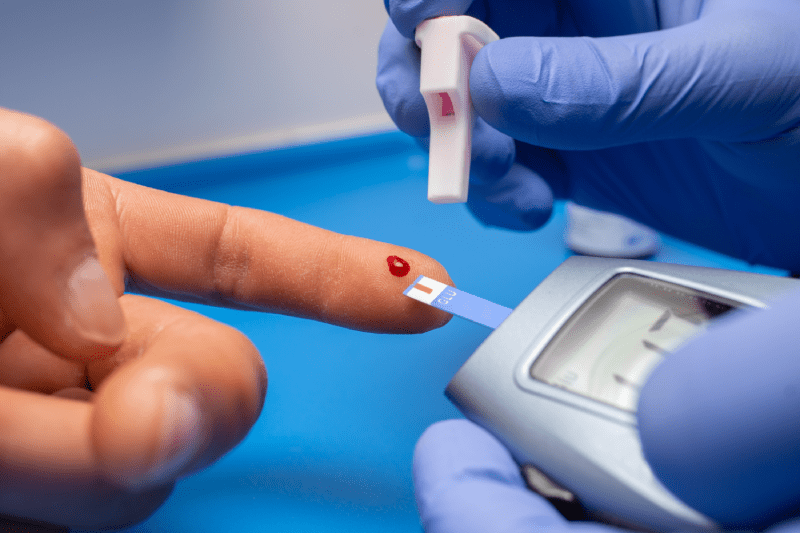What is Metabolic Surgery and Who is it Applied to?
Metabolic surgery is a series of surgical operations used in the treatment of metabolic syndrome disorders such as type 2 diabetes and obesity. These surgeries not only provide weight loss but also focus on regulating intestinal hormones and metabolism.
It is suitable for patients with type 2 diabetes as well as additional diseases such as high blood pressure, high cholesterol, and sleep apnea, who have high insulin resistance.
The main goal of the operation is to improve the patient’s quality and duration of life by reducing medication dependency. This procedure is generally recommended for individuals with a body mass index (BMI) of 30 or higher who have not achieved success with conventional treatment methods.
What is the Difference Between Metabolic Surgery and Sleeve Gastrectomy (Bariatric Surgery)?
Although both metabolic surgery and sleeve gastrectomy are used in the treatment of obesity, their primary goals are different. Sleeve gastrectomy aims to achieve weight loss by reducing the size of the stomach and is primarily a weight-loss focused procedure.
Metabolic surgery, on the other hand, aims to treat type 2 diabetes and other metabolic diseases not only by providing weight loss but also by regulating intestinal hormones and increasing insulin sensitivity. In these surgeries, the intestines are rerouted to change the path and speed of nutrient absorption, thus triggering a hormonal response and ensuring metabolic control. Therefore, metabolic surgery is more focused on solving underlying metabolic problems like diabetes.
What is the Effect of Metabolic Surgery on Type 2 Diabetes?
Metabolic surgery has a revolutionary effect on the treatment of type 2 diabetes. After the operation, the change in the nutrient absorption pattern of the intestines increases the secretion of intestinal hormones that control blood sugar. This hormonal change increases insulin sensitivity and allows the body to use its own insulin more effectively.
Many patients observe that the need for insulin or other diabetes medications decreases or disappears completely immediately after the surgery. This process not only controls blood sugar but also significantly reduces the risk of complications such as heart disease, kidney failure, and vision loss that may develop due to diabetes.
Why is Metabolic Surgery Popular in Turkey?
Turkey has become a worldwide center for metabolic surgery. This popularity is due to the presence of modern hospitals that provide services at international standards, state-of-the-art equipment, and highly experienced specialized surgeons. Additionally, the cost of operations in Turkey is much lower compared to similar procedures in Europe and America. Combining high-quality healthcare services with affordable prices makes Turkey an attractive destination for international patients. Patients also benefit from comprehensive post-operative follow-up programs, ensuring a safe experience.
How Much Does Metabolic Surgery Cost in Turkey?
The cost of metabolic surgery in Turkey varies depending on the type of operation, the surgeon’s experience, the hospital’s quality, and the scope of the package. It is generally 50% to 70% of the prices in Western countries. Package prices typically cover the surgical fee, hospital stay, anesthesia, necessary medical supplies, and post-operative follow-up processes. These prices are determined based on the patient’s specific situation rather than a single figure. Therefore, the most accurate way to get a cost estimate is to contact the clinic directly.
What Do Metabolic Surgery Package Prices Include?
The metabolic surgery packages offered in Turkey are usually quite comprehensive to facilitate the patient’s travel and treatment process. The content of a standard package covers the fees of the surgeon and anesthesiologist, operating room use, hospital stay, and necessary medications. For patients from abroad, these packages usually also include airport transfers, accommodation, a multilingual patient coordinator, and post-operative check-ups. This way, patients can focus on the treatment process without having to worry about other logistical details.
How Long Does the Surgery Procedure Take?
The duration of metabolic surgery operations varies according to the type of operation chosen. For example, a Sleeve Gastrectomy operation usually takes 1-2 hours, while more complex procedures such as Gastric Bypass or Transit Bipartition can take 2-4 hours. Operations are usually performed using the laparoscopic (closed) method, which speeds up the recovery process and leaves fewer scars. The surgeon provides detailed information about the estimated duration of the operation during the pre-operative consultation.
How Long is the Hospital Stay for the Surgery?
The hospital stay after metabolic surgery may vary depending on the type of operation and the patient’s general health condition. Patients usually stay in the hospital for 3 to 5 days after the operation. During this period, the patient’s condition is closely monitored, the first steps of nutrition are checked, and precautions are taken against possible complications. The decision to discharge the patient from the hospital is made by the surgeon based on the patient’s recovery process and general condition.
What is the Recovery Process Like After Surgery?
The recovery process after metabolic surgery, although it varies depending on the type of operation, is generally fast. Patients are kept under close observation in the hospital for the first few days. The home recovery process usually takes a few weeks. During this period, the patient transitions from a liquid diet to pureed foods and finally to soft solid foods. It is important to avoid heavy physical activities and weight lifting. Most patients can return to their normal work and social life 2-4 weeks after the operation. Full recovery and body shape settling can take months.
Is Pain Felt After the Surgery?
Post-operative pain is generally minimal and can be easily controlled with pain relievers prescribed in the hospital. Laparoscopic operations cause less pain compared to open surgery. Patients may experience a slight tightness or discomfort in the abdominal area, but this subsides over time. The pain relievers prescribed for use at home are sufficient for a comfortable recovery process.
Is Metabolic Surgery Applicable for Type 1 Diabetes Patients?
No, metabolic surgery operations are not suitable for type 1 diabetes patients. Type 1 diabetes is a condition where the pancreas cannot produce any insulin, and these surgical procedures are not aimed at increasing insulin production. The operations are specific to type 2 diabetes patients who have high insulin resistance, as they enable the body to use its own insulin more effectively. Therefore, a clear understanding of the difference between type 1 and type 2 diabetes is of critical importance before making a surgical decision.
What is the Effect of Anesthesia on Metabolic Surgery?
Metabolic surgery operations are generally performed under general anesthesia. The anesthesiologist evaluates the patient’s general health, weight, and other medical factors in detail to ensure the operation can be performed safely. Special anesthesia methods and equipment may be used for overweight patients. The type and dose of anesthesia are adjusted according to the patient’s age, weight, and the duration of the operation. This process ensures that the operation is completed comfortably and safely.

How Should Nutrition Be After Surgery?
Post-operative nutrition is vital for the success of metabolic surgery. Patients are fed with only liquid foods for the first few days after the surgery. They then gradually transition to pureed foods and then to soft solid foods. The nutrition plan is specially prepared by a dietitian and is designed to meet the patient’s protein, vitamin, and mineral needs. This process is critical for the stomach to adapt to its new volume and the intestines to their new arrangement.
Which Vitamin Supplements are Used After Surgery?
After metabolic surgery, it is usually mandatory for patients to use vitamin and mineral supplements for life. Since the operation alters nutrient absorption, deficiencies of important vitamins and minerals such as vitamin B12, iron, calcium, vitamin D, and folic acid may occur in the body. These supplements are determined by the surgeon or dietitian by regularly checking the patient’s blood values. This is very important to prevent possible nutritional deficiencies and protect the patient’s health.
When Should Exercise Be Started After Surgery?
Exercise after surgery is important to support weight loss and speed up recovery, but it should be started at the right time. Patients can start taking short walks within a few days after the operation. Heavy exercises and weight lifting can usually be started with the surgeon’s approval, 4-6 weeks after the surgery. The exercise program should be adjusted according to the patient’s physical condition and recovery speed.
Is Permanent Weight Loss Possible After Metabolic Surgery?
Yes, it is possible to achieve permanent weight loss with metabolic surgery. The operation not only provides weight loss but also leads to hormonal changes that reduce appetite and increase the feeling of fullness. However, long-term success depends on the patient adopting healthy eating habits and exercising regularly. These lifestyle changes ensure the permanence of the operation’s results.
What Should Be Done for the Long-Term Success of the Surgery?
The long-term success of the surgery depends on the patient’s lifestyle changes. For a successful outcome, the patient must regularly go for doctor and dietitian check-ups, use the recommended vitamin supplements regularly, and stick to a healthy nutrition program. In addition, regular physical activity is vital for both weight control and general health. These changes help the patient live a diabetic-free and healthy life.
Can I Get Pregnant After Surgery?
Pregnancy is possible after metabolic surgery, but experts usually recommend waiting at least 18-24 months after the operation. This period is necessary for the body to adapt to the nutritional changes and weight loss. During this time, nutrient supplements should be taken regularly, and the pregnancy process should be closely monitored by a specialist. With proper planning, the surgery does not pose a risk for pregnancy.
For Which Diseases is Metabolic Surgery Applied?
Metabolic surgery is primarily used in the treatment of type 2 diabetes as well as other components of metabolic syndrome such as obesity, high blood pressure (hypertension), high cholesterol (hyperlipidemia), and sleep apnea. The surgery not only alleviates the symptoms of these diseases but also offers a solution for their underlying causes.
What are the Risks of the Surgery?
As with any surgical procedure, metabolic surgery also has some risks. Possible risks include bleeding, infection, complications related to anesthesia, problems with wound healing, and nutrient malabsorption. However, these risks can be minimized by choosing an experienced surgeon and a modern hospital. All risks and benefits are shared in detail with the patient before the surgery.
How to Choose a Surgeon in Turkey?
When choosing a surgeon for metabolic surgery in Turkey, it is very important to pay attention to the surgeon’s experience and expertise in this field. You should research the number of operations the surgeon has performed, their success rates, and patient reviews. It is also important that the hospital where the surgery will be performed has international accreditations and modern technology. The communication you establish with your surgeon and your trust in them also play a decisive role in the decision-making process.
How Should Preparation Be Done Before Surgery?
Pre-operative preparation is vital for the success of the operation. Your surgeon will request pre-operative blood tests, endoscopy, and other necessary check-ups. Smoking and alcohol consumption should be stopped at least 2 weeks before the surgery, and the doctor should be informed about regularly used medications. A healthy diet and an exercise program recommended by the doctor are also part of the preparation process.
What Kind of Check-ups are Done After Surgery?
After metabolic surgery, patients are regularly followed up. The first check-up is done in the hospital the day after the operation. After being discharged, patients are checked more frequently for the first few months, and then at rarer intervals. In these check-ups, the patient’s blood values, weight status, and general health are evaluated. This follow-up process is important to detect possible complications early and to ensure the patient progresses healthily.
How Long Does the Post-operative Diet Program Last?
The post-operative diet program is a lifelong program that the patient must maintain. Nutrition, which starts with liquids, pureed, and soft foods in the first months, gradually transitions to solid foods over time. The dietitian creates a balanced and healthy nutrition plan suitable for the patient’s new body structure. This plan is vital for controlling weight and preventing nutrient deficiencies.
How Does the Appearance Change After Metabolic Surgery?
Significant and positive changes occur in the appearance after metabolic surgery. Weight loss helps the body contours become more defined and provides a more aesthetic appearance. However, some patients may experience skin sagging due to rapid weight loss. This can be corrected with regular exercise and, in some cases, with additional aesthetic operations. Most importantly, patients feel better about themselves and their quality of life improves.
How is the Decision for Surgery Made?
The decision for metabolic surgery is made after a detailed examination of many factors such as the patient’s general health condition, the duration and type of diabetes, insulin resistance, and body mass index. A team consisting of a surgeon, an endocrinologist, a dietitian, and a psychologist evaluates the patient with a multidisciplinary approach. After all these evaluations, it is decided whether the patient is a suitable candidate for the operation.
Can Diabetes Medications Be Stopped After Surgery?
Many patients observe that the need for type 2 diabetes medications decreases or disappears completely after metabolic surgery. This happens because the operation regulates intestinal hormones and increases insulin sensitivity. However, stopping medications completely or adjusting their doses should only be done under the doctor’s supervision and with regular blood sugar monitoring.
What is the Quality of Hospitals in Turkey?
Hospitals in Turkey are very modern and technologically advanced thanks to investments in health tourism. Many hospitals have JCI (Joint Commission International) accreditation, which represents international health standards. This accreditation shows that the hospital’s quality and safety are at an international level. This way, patients can be sure that they will receive the best medical service.
How Does the Process Work for Patients Coming from Abroad?
The process for patients coming from abroad usually starts with an online consultation. The patient tells the surgeon about their medical history and expectations. After the necessary documents and test results are examined, the surgery date is planned. When the patient arrives in Turkey, they are picked up from the airport and assisted with accommodation. Final pre-operative check-ups are done, and the operation is performed. The patient’s follow-up continues after they are discharged.

Is Metabolic Surgery a Permanent Solution?
Metabolic surgery can offer a permanent solution for metabolic disorders such as type 2 diabetes and obesity, but this depends on the patient permanently adopting lifestyle changes. The operation makes the body work healthier by causing hormonal and physiological changes. However, unhealthy eating habits and a sedentary lifestyle can jeopardize long-term success.
Why are Doctors in Turkey Popular?
Plastic surgeons in Turkey are internationally recognized experts who have received extensive training in this field. They have a great deal of experience, especially in aesthetic surgery, as they perform a high number of operations. They are also specialized in providing services to foreign patients and have well-developed multilingual communication skills.
Does Post-Operative Massage Speed Up Healing?
Post-operative massage is not a specific recommendation for metabolic surgery, but techniques like lymphatic drainage massage can help reduce swelling in the body. Such massages should be done with the surgeon’s approval and usually a few weeks after the operation, once wound healing is complete. These massages can help swelling go down faster and make the patient feel more comfortable.
What are the Most Important Rules of the Post-Operative Diet?
The most important rules of the post-operative diet are to eat small portions frequently, prioritize a protein-rich diet, and drink plenty of fluids. Meals should be eaten slowly and chewed thoroughly. Sugary, fatty, and high-carb foods should be avoided. Also, care should be taken not to consume liquids with meals, as this can strain the new stomach volume.
Is Hair Loss Experienced After Surgery?
Due to rapid weight loss and dietary changes after metabolic surgery, some patients may experience temporary hair loss. This usually occurs 3-6 months after the operation and is caused by hormonal changes or vitamin deficiencies. This can be prevented or its effect can be reduced by taking adequate protein and vitamin supplements. Hair loss is usually temporary and returns to normal as the body adjusts to the new situation.
What is the Effect of the Surgery on Sexual Life?
Metabolic surgery can have positive effects on sexual life as it reduces the health problems caused by type 2 diabetes and obesity. Weight loss increases the level of physical activity and boosts self-confidence, which can increase sexual desire and performance. Additionally, problems such as erectile dysfunction caused by diabetes can also improve with the operation.
What are the Psychological Effects of the Surgery?
Metabolic surgery has a profound effect on both the physical and psychological health of patients. Weight loss and controlling diabetes increase patients’ self-confidence and improve their social lives. However, the process of adapting to rapid body changes can be challenging for some patients. Getting psychological support during this process can help the patient adapt more easily to this major change.
How Do Shopping Habits Change After Metabolic Surgery?
Shopping habits change significantly after metabolic surgery, as the patient must adapt to a new dietary regimen. Healthier foods, fresh vegetables and fruits, protein sources, and low-carb products are preferred. The consumption of processed foods and fast food decreases. These changes are beneficial not only for the patient’s physical health but also for their mental health.
How Many Months Does it Take to Reach an Ideal Weight After Surgery?
The weight loss process after metabolic surgery varies depending on the patient’s starting weight, metabolic rate, and lifestyle changes. The fastest weight loss usually occurs in the first 6 months. Patients can lose 60-80% of their excess weight within 1 to 2 years after the operation. Regular check-ups and follow-up are very important during this process.
Are Acne and Skin Problems Experienced After the Operation?
Hormonal changes, rapid weight loss, and sudden changes in diet can temporarily cause skin problems such as dryness or acne in some patients. This condition is usually temporary and resolves as the body adjusts to the new situation. Taking care of skin and drinking plenty of water can reduce the effect of these problems.
When Can I Return to Heavy Sports After Surgery?
To start heavy sports and weight lifting after metabolic surgery, the surgeon’s approval should be awaited. This is usually possible 6 to 8 weeks after the operation. The muscles and tissues in the operated area need time to fully heal. Doing heavy sports before this period can lead to complications such as wound dehiscence.
Is Psychological Support Necessary Before Surgery?
Metabolic surgery is not just a physical change but also a major lifestyle change. Therefore, getting psychological support before the operation can be beneficial for many patients. A psychologist can evaluate the patient’s motivation, help them set realistic expectations, and prepare them mentally for the post-operative process.
What are the Possible Complications After Surgery?
Possible complications of metabolic surgery include bleeding, infection, staple line leakage, hernia formation, and vitamin deficiencies. However, these complications are rare, and the risks are minimized in a modern hospital setting with an experienced team. All risks are shared with the patient before the surgery, and a plan of action is made in case of a possible situation.



